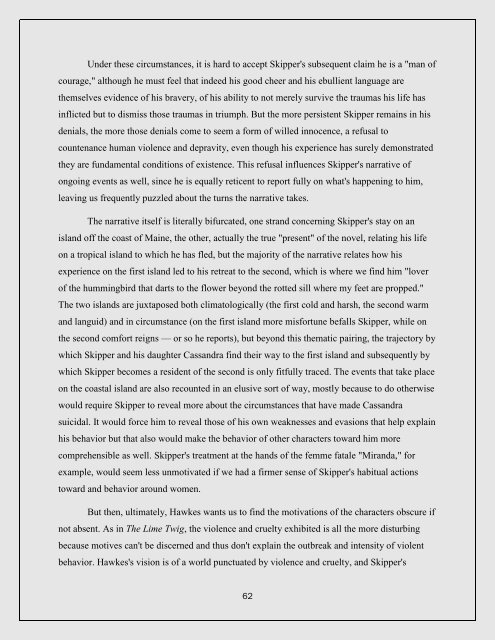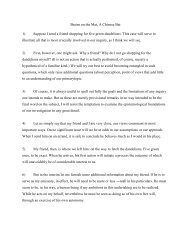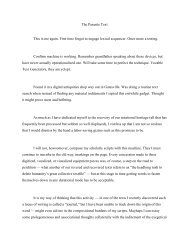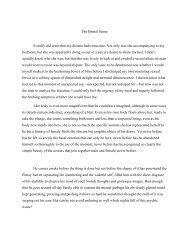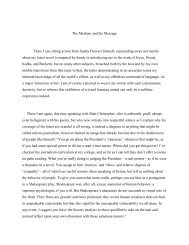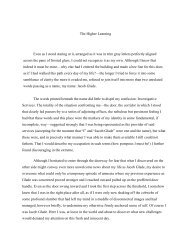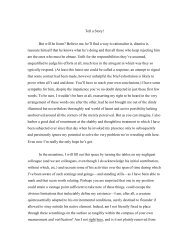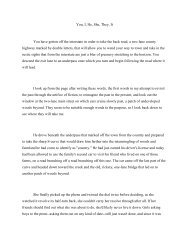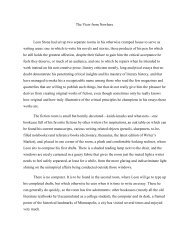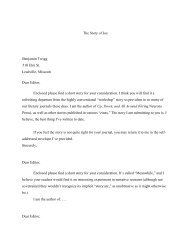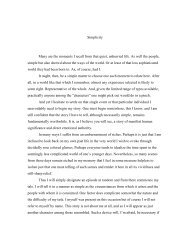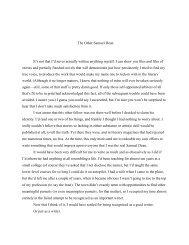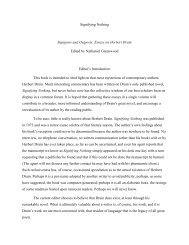APF
You also want an ePaper? Increase the reach of your titles
YUMPU automatically turns print PDFs into web optimized ePapers that Google loves.
Under these circumstances, it is hard to accept Skipper's subsequent claim he is a "man of<br />
courage," although he must feel that indeed his good cheer and his ebullient language are<br />
themselves evidence of his bravery, of his ability to not merely survive the traumas his life has<br />
inflicted but to dismiss those traumas in triumph. But the more persistent Skipper remains in his<br />
denials, the more those denials come to seem a form of willed innocence, a refusal to<br />
countenance human violence and depravity, even though his experience has surely demonstrated<br />
they are fundamental conditions of existence. This refusal influences Skipper's narrative of<br />
ongoing events as well, since he is equally reticent to report fully on what's happening to him,<br />
leaving us frequently puzzled about the turns the narrative takes.<br />
The narrative itself is literally bifurcated, one strand concerning Skipper's stay on an<br />
island off the coast of Maine, the other, actually the true "present" of the novel, relating his life<br />
on a tropical island to which he has fled, but the majority of the narrative relates how his<br />
experience on the first island led to his retreat to the second, which is where we find him "lover<br />
of the hummingbird that darts to the flower beyond the rotted sill where my feet are propped."<br />
The two islands are juxtaposed both climatologically (the first cold and harsh, the second warm<br />
and languid) and in circumstance (on the first island more misfortune befalls Skipper, while on<br />
the second comfort reigns — or so he reports), but beyond this thematic pairing, the trajectory by<br />
which Skipper and his daughter Cassandra find their way to the first island and subsequently by<br />
which Skipper becomes a resident of the second is only fitfully traced. The events that take place<br />
on the coastal island are also recounted in an elusive sort of way, mostly because to do otherwise<br />
would require Skipper to reveal more about the circumstances that have made Cassandra<br />
suicidal. It would force him to reveal those of his own weaknesses and evasions that help explain<br />
his behavior but that also would make the behavior of other characters toward him more<br />
comprehensible as well. Skipper's treatment at the hands of the femme fatale "Miranda," for<br />
example, would seem less unmotivated if we had a firmer sense of Skipper's habitual actions<br />
toward and behavior around women.<br />
But then, ultimately, Hawkes wants us to find the motivations of the characters obscure if<br />
not absent. As in The Lime Twig, the violence and cruelty exhibited is all the more disturbing<br />
because motives can't be discerned and thus don't explain the outbreak and intensity of violent<br />
behavior. Hawkes's vision is of a world punctuated by violence and cruelty, and Skipper's<br />
62


